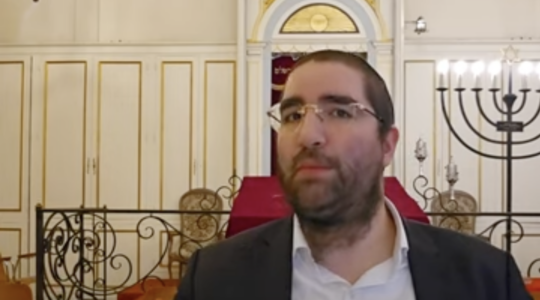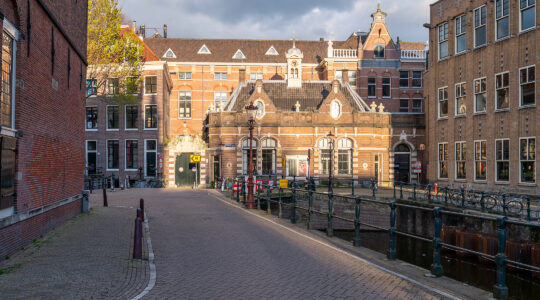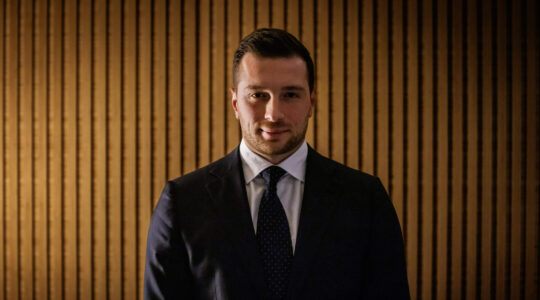ORADEA, Romania (JTA) — In the garden of the Zion Synagogue, a grove of newly planted fruit trees is struggling for life. The synagogue, whose silver dome towers over this city of 210,000 in western Romania, has fallen into disrepair since it ceased functioning in 1995, a casualty of the city’s declining Jewish community.Inside, the sanctuary is a shadow of its former shelf. Thieves have made off with the chandeliers and light fixtures. The floorboards and pews were ripped out and burned as firewood in an attempt to stave off the harsh Romanian winter. And the garden, wedged between the synagogue and the tranquil Crisul Repede River, is overgrown and filled with trash.Built in 1878, the synagogue was the centerpiece of a flourishing prewar community of 33,000 Jews, more than 90 percent of which was wiped out in the Holocaust. But in the years since it stopped hosting regular Shabbat services, the building has slowly lost its grandeur.”I want the synagogue backyard to look nice,” says Kepes Sandor, 73, the building’s caretaker, who planted the plum and apricot trees. “What kind of thing is this, that you leave a synagogue backyard untended?”Like Zion’s garden, Romania’s Jewish community has lain fallow for decades, its finest crop of young people heading to Israel or the West in search of better lives. But having weathered Nazism and communism, Romanian Jewry is showing new signs of life.Around the corner from Zion, a Jewish community center is under construction, complete with a fitness center and kosher pizza cafe. An energetic cadre of university students teaches in the religious school and helps fill the pews at Friday evening services. And in January, a young rabbinical student arrived from New York for a six-month stint — the country’s only “rabbi” outside Bucharest.”Generally speaking, it is a renaissance of Jewish life here in Romania,” says Aurel Vainer, president of the Federation of Jewish Communities of Romania and the community’s representative in Parliament.The remnant of Romanian Jewry that survived the Holocaust returned to face still another threat to its existence in the form of communism. Now, nearly two decades after the fall of Nicolae Ceausescu, Romania’s brutal communist dictator, the scars of that period are fading.”The Jews come back and they have pleasure to be together with their brothers and sisters,” Vainer says. “It is a new kind of life now.”Like many post-communist societies, Romania’s path to democracy has been riddled with potholes.The Ceausescu regime was particularly oppressive, even by Eastern European standards — its secret police force of 11,000 was among the Soviet bloc’s largest proportional to the population — and the country has struggled to cope with its legacy.During Passover, a political crisis resulted in the dismissal of Justice Minister Monica Macovei, a leading crusader against government corruption.Nevertheless, with its entry into the European Union in January, Romania appears inexorably, if haltingly, headed in the right direction. But the sense of burgeoning optimism evident in the headlines hasn’t filtered down to Oradea’s Jews, who still exude a sense of gloom.”Nothing is sure here,” says Edith Homonnai, 20, a student of psychology and international relations at the University of Oradea, who says she yearns to leave Romania. Despite the promise of E.U. membership, Homonnai notes wryly, “everything is increasing except the paychecks.””Nobody can assure me that I will have the possibility to be independent and not live with my parents for the rest of my life,” she says.While the young fret about their economic future in a country whose journey to Western prosperity is certain to be long and arduous, the community’s senior members — the vanishing repository of Romania’s prewar Jewish memory — worry that their passing will herald the end of traditional Jewish life here.”They want everything, but they don’t know and they don’t want to learn their religion,” Lazar Freund, one of the community’s most senior members, says of the younger generation.At 85, Freund is among the few who remember life before the Nazis, and his mournful eyes betray an absence of hope at what will follow him. “They do wonderful things regarding community life,” like dancing and choir, he says, but “nothing which is connected with the synagogue.”Between the poles of young and old is a vast leadership vacuum. Romanian Jews in their 40s, 50s and 60s are in short supply, their ranks thinned by the Holocaust and four decades of communist rule. Those that are present are frequently less literate Jewishly than the youth, who came of age after the fall of the Iron Curtain and have benefited from educational and travel opportunities denied to their parents.”They’re called the lost generation because their parents were survivors of Auschwitz and that’s why they never really connected to their identity,” says Homonnai, who teaches a weekly class in Maimonides’ principles of faith to students twice her age.But perhaps the biggest challenges facing Oradea’s Jews, as in many post-Soviet Jewish communities, are the problems born of a half-century of rampant intermarriage. Under communism few could find Jewish mates, resulting in a community in which many members are not Jewish according to religious law.Menachem Hacohen, Romania’s Israeli-born chief rabbi, says the return of these non-halachic Jews to the fold is one of his main objectives, but he has made little progress persuading the Israeli rabbinate to relax their conversion standards.”I think they are a lost case,” Hacohen says of the rabbinate. “We have to find our own ways and to create our own tools how to solve this problem.”Teodor-Felix Koppelmann, who has led the Oradea Jewish community for 15 years, says the hardest part of his job is maintaining a daily minyan — even if 20 people show up, fewer than half can be counted toward the quorum of 10. Unlike many in the community, Koppelmann claims to be somewhat optimistic about the future.”I don’t say it’s perfect what we have here, but it’s far better than the rest,” Koppelmann says. “In 10 or 20 years we’re going to be better Jews, whatever happens, than we are today. In the future things cannot get worse, they can only get better.”One source of hope for Oradea was the arrival in January, after years of clamoring, of rabbinical student Yitzhak Szyf. At a Passover seder Szyf led for some 120 people, he delivered a message that seemed tailor-made for his audience.Explaining the seder portion in which five famous rabbis are said to have spent the whole night relating the story of the Exodus, Szyf noted that Rabbi Akiva was known for his optimism.”They started the seder in darkness, but after spending a night with Rabbi Akiva, their students saw the light,” Szyf said in English, his words translated into Romanian. “He succeeded in teaching them that even in the worst situation, it’s worth being optimistic.”On Pesach, the entire commandment is at night because that’s the whole point of Pesach, to take the night and turn it into a day.”
JTA has documented Jewish history in real-time for over a century. Keep our journalism strong by joining us in supporting independent, award-winning reporting.





